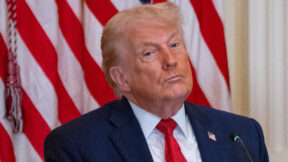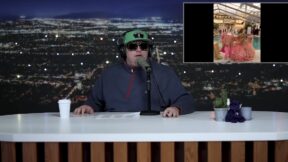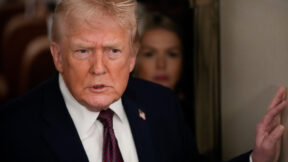‘Like What?’ Psaki Challenges Peter Alexander To Say What Threat The US Should Use Against Russian Chemical Attack
White House Press Secretary Jen Psaki challenged NBC News White House correspondent Peter Alexander to speak aloud the precise threat he thinks the U.S. should use to deter a Russian chemical attack.
At Thursday’s press briefing, Ms. Psaki fielded a slew of questions about the prospect of a Russian chemical or biological attack on Ukraine, a concern that the Biden administration raised in response to things like Russia’s attempts to project such intentions on Ukraine.
Many of those questions had to do with whether the U.S. would respond to a chemical attack militarily, a notion that Psaki tried to dispel. But she was blunt in confronting Alexander when he suggested an unidentified communication strategy to deter Russia:
MR. ALEXANDER: Jen, you said earlier to one of my colleagues that nothing that Russia has done so far in terms of this invasion has gone unanswered, when you were being asked about bio and chemical weapons. Obviously, none of what we have done to answer Russia has steered them from continuing this invasion. So why not consider some alternate strategy to communicate to Russia the consequence if they are to do a bio or chemical weapons strike inside Ukraine?
MS. PSAKI: Like what?
MR. ALEXANDER: I’m asking you. In other words, why not communicate — you won’t say if it’s a “red line,” right? Because you won’t say it’s not our intention right now. So let me start there. Is there any red line for Russia that the U.S. would have some involvement where the military entered into Ukraine?
MS. PSAKI: I’m not going to get into red lines from here, Peter. What I would tell you is that when I said we have not let anything go unanswered, what I mean is that we have amped up a range of military and security assistance, a historic amount to Ukraine, including a range of defensive weapons, which we’ve expedited the delivery. Even in the last 10 days, we’ve delivered about $240 million of that.
And also, we’ve provided a range of humanitarian assistance. And we have basically crushed the Russian economy, which — where the — where the stock market is not even open. So it’s inaccurate to suggest it’s gone unanswered. We have taken all those steps and rallied the world.
MR. ALEXANDER: And I’m not saying that’s gone unanswered. You say it’s gone answered; we’ve witnessed the answer in the form of sanctions. I’m saying, given the potential that you’ve indicated that Russia could use a bio or chemical weapons strike there, why wouldn’t the U.S. communicate to them something that is not an answer, but instead preemptive, to communicate the consequence if they are to take what would be a horrific — this war to a horrific new level?
MS. PSAKI: The President’s first and most important objective is the national security and interest of the United States and being clear and direct with the American people. He has been clear and direct with the American people. He is not intending to send U.S. troops to fight in Ukraine against Russia to start another war. That that would be an escalatory step; that would not be in our national security interests and not in the interests of NATO.
What we have conveyed is Russia’s capabilities, their capacities, and their pattern of using chemical and biological weapons.
MR. ALEXANDER: And so, what does he say then — that’s the message to the American people: his responsibility to them, of course, is before any other. What does he say to Vladimir Putin? If those at the head of the Russian government are considering that, what do you say to them watching right now?
MS. PSAKI: We have been very clear, and our actions have been the evidence of this, that there will be significant consequences for every escalatory step that is taken by President Putin and the Russian government.
Watch above via The White House and Fox News.





Comments
↓ Scroll down for comments ↓